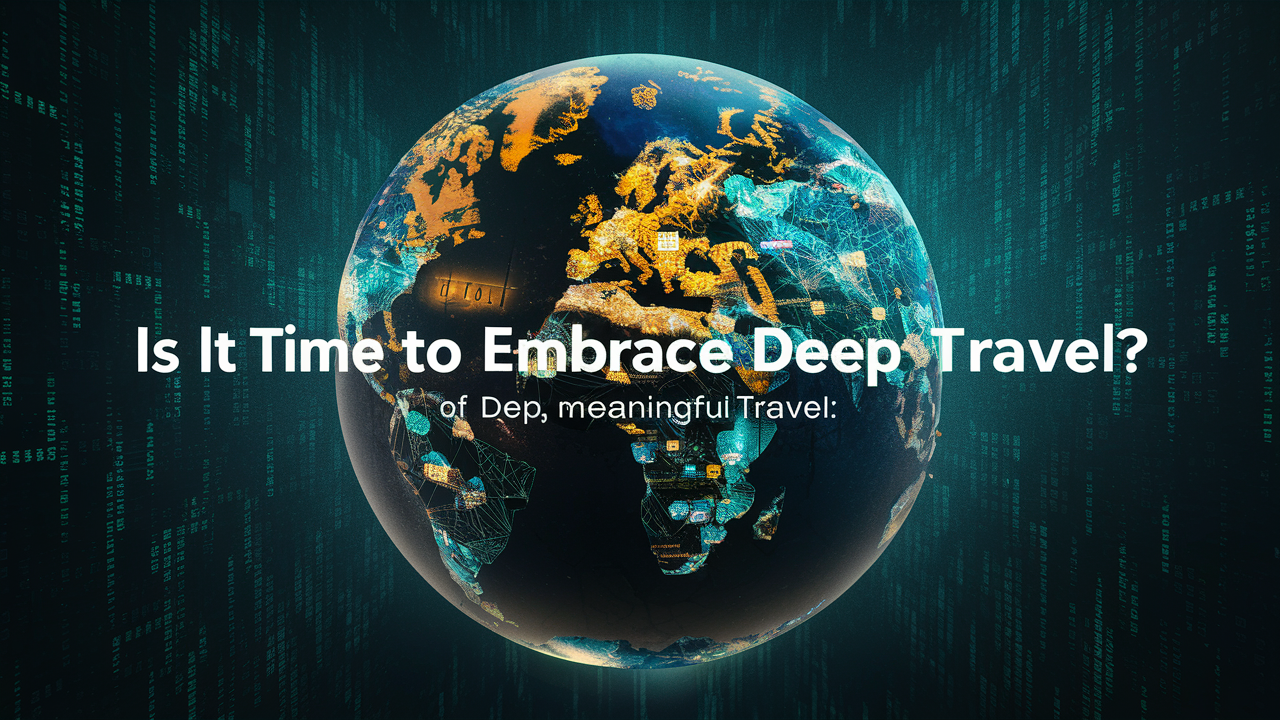Is It Time to Embrace Deep Travel: Do you view travel as a break to relax and unwind? Or as an opportunity for new discoveries and expanding your worldview? If the latter resonates, you may already be embracing the idea of deep travel.
While the tourism industry took an understandable pause in recent years, travel is now ramping back up in full force. As we plan our next big trips, it’s the perfect moment to rethink how we travel.
Deep travel offers a framework for more mindful, meaningful tourism focused on connection rather than consumption. Keep reading to learn what deep travel is all about, and why right now is the time to embrace this approach.
What is Deep Travel?

There’s no single definition, but deep travel is generally seen as traveling with the purpose of fostering deeper understanding of a place through authentic experiences.
Rather than racing to see the top attractions, deep travel is about slowing down. It means truly getting to know the history, food, people and culture of a destination.
Former New Yorker writer Tony Hiss described deep travel as “an exhilarating state of mind” where “everything seems suddenly fresh, vivid, intensely interesting and memorable.”
For many, deep travel is about seeking experiences that provide perspective on local life. It’s tourism motivated by a hunger to learn rather than a list to conquer.
Why Deep Travel Promotes Responsible Tourism

This mindset of traveling to connect rather than collect naturally lends itself to more responsible tourism. Here’s how deep travel encourages sustainability:
- Supports local economies – By investing time and money into authentic local businesses and guides
- Reduces overtourism – Encourages seeing fewer places, but seeing them more meaningfully
- Lowers carbon footprint – Promotes slower forms of transportation and less frequent flying
- Fosters cultural exchange – Leads to greater understanding between travelers and destinations
Particularly as we rebuild tourism in a post-pandemic world, deep travel principles provide guidance for traveling thoughtfully and ethically.
Distinguishing Between Travel and Tourism
To understand deep travel, it helps to first examine the difference between travel and tourism. While subtle, the distinction is important.
Tourism tends to be associated with leisure, relaxation, entertainment and convenience. Picture resort vacations filled with amenities and activities within an engineered bubble.
Travel goes beyond superficial enjoyment and involves active discovery, learning and broadening perspectives. Travel is tourism with purpose.
Both tourism and travel have value. Travel can involve tourism activities while also incorporating mindful exploration. Deep travel falls squarely on the travel end of the spectrum.
Vacations Provide Relaxation, Travel Offers Transformation
I’ve experienced both relaxing vacations and mind-expanding travels.
A few years ago I spent a blissful long weekend at an all-inclusive resort in Cuba. I lounged poolside with a book, without any agenda beyond resting my mind and body.
It was glorious, but not an experience that substantially impacted my worldview. In contrast, backpacking around rural regions of Cuba helped me gain insight I never could have found in the confines of that resort.
Hearing stories from locals and fellow travelers expanded my outlook. While tourism provides recreation, travel can provide transformation through powerful cultural exchange.
Questioning the Pursuit of “Authentic” Experiences
One aspect of deep travel philosophy worth examining is the idea of “authentic” experiences. As travelers, of course we want to gain genuine insight into local ways of life.
But can we ever truly understand the complex social fabric of a place in a short visit? As an ephemeral outsider, my perception of “authentic” Cuba was likely oversimplified.
Rather than definitively grasping a culture, travelers can instead approach experiences with openness to learn. We must accept the limitations of our brief glimpses into other people’s deeply rooted, nuanced realities.
6 Tips for Meaningful Deep Travel
Focus less on “authenticity” and more on forging connections. Here are 6 tips for planning a deeply enriching trip:
1. Learn Before You Go
Researching your destination sets the stage for deeper appreciation. Study its history, values, sociopolitical landscape, and customs. Locals will appreciate your baseline knowledge.
2. Ditch the Tourist Bubble
Stray from crowded hotspots filled with other travelers. Explore residential neighborhoods, local markets, mom and pop cafés. Live more like a resident than tourist.
3. Slow Down Your Pace
Resist the urge to meticulously plan days filled with sightseeing. Leave ample free time for leisurely strolls, spontaneous encounters and unstructured adventures.
4. Hire Local Guides
A knowledgeable local guide provides insider context you’d otherwise miss. Many offer specialized tours focusing on culture, street art, cuisine, ecotourism.
5. Dine Local, Not Global
Patronize family-owned eateries serving traditional cuisine. Try dishes you’ve never heard of and chat with owners. Food is the conduit to culture.
6. Buy From Local Artisans
Skip generic souvenir shops and visit local artisans instead. Chat with craftspeople to better understand their creative process and cultural heritage.
Finding Deeper Purpose in Travel
Approaching travel as a vehicle for human connection, dispelling assumptions and gaining perspective is incredibly rewarding.
Superficial tourism scratches the surface, while deep travel enriches the spirit. The latter awakens you to the incredible diversity of our world.
a close up of a salad in Greece
COVID Has Spurred a Reckoning in the Travel Industry
In the wake of COVID-19 shutdowns, travelers and travel companies have reflected on how we can rebuild tourism responsibly.
According to the UNWTO, international arrivals are rebounding steadily. As we plan long-awaited trips, we have the opportunity to improve.
Destinations like Iceland and Kyoto implemented sustainable tourism initiatives during their downtime. As travelers, we too can play a role by embracing mindful values like those encompassed in deep travel philosophy.
Deep Travel Promotes Cultural Understanding
Responsible tourism and deep travel share an emphasis on cross-cultural appreciation versus appropriation.
It entails forging personal connections versus detached observation and earnest learning rather than assumptions.
With inclusive attitudes and compassionate curiosity, travelers can foster bonds that chip away at “othering” tendencies. Deep travel done thoughtfully illuminates our shared humanity.
Final Thoughts on Deep Travel
As Anthony Bourdain famously said, “Travel isn’t always pretty. It isn’t always comfortable. Sometimes it hurts, it even breaks your heart.”
While scenic vistas, comfort foods and familiar rituals offer joy, travel’s deepest rewards stem from leaning into the unfamiliar. From sitting with stories unlike our own.
By traveling slowly, mindfully and humbly seeking connection, we gain an education unattainable within the walls of our daily lives.
Deep travel illuminates the exhilarating diversity of human experience. If you’re seeking not just escape but expansion, now is the time to dive in.
How do you build cultural connection and perspective through your travels? Share your approach to meaningful deep travel in the comments!
FAQs
What is deep travel?
Deep travel involves exploring a destination through authentic local experiences to foster deeper connections, learning, and cultural exchange versus superficial tourism.
How does deep travel differ from regular vacations?
Deep travel is about purposeful cultural immersion, while regular vacations prioritize relaxation and entertainment without necessarily seeking profound cross-cultural engagement.
What are some tips for traveling deeply?
Tips include hiring local guides, taking public transit, eating local cuisine, avoiding tourist hotspots, traveling slowly, and researching destinations beforehand.
Why is now a good time to embrace deep travel?
As tourism rebuilds post-COVID, deep travel allows us to be more responsible, ethical travelers focused on cultural exchange versus checklist tourism.
How can you have a meaningful deep travel experience?
Seek activities involving meaningful interaction with locals, focus on learning, and approach experiences with an open mind rather than expecting “authenticity.”

























